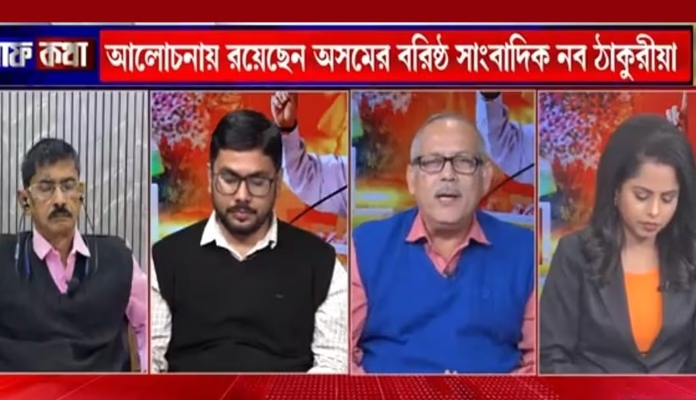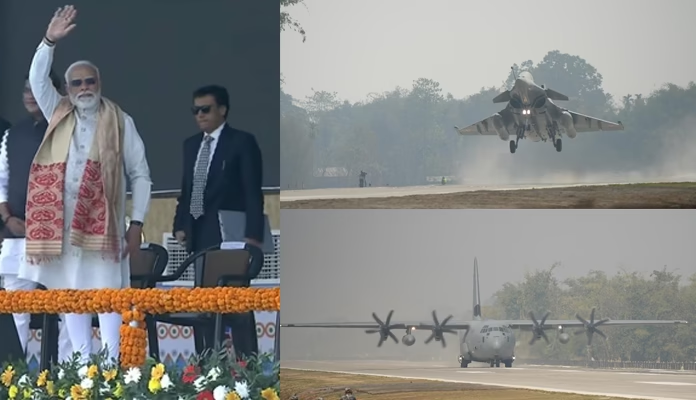
 by Nava Thakuria
by Nava Thakuria
Assam’s maverick singer Zubeen Garg had always been a headline-maker. His mysterious death, thousands of kilometres away in Singapore, has once again placed him at the centre of media storms — this time for all the wrong reasons. As news of his demise spread, Assam’s media went into overdrive, spinning conflicting narratives and speculations about how the cultural icon met his tragic end on foreign soil.
Media Frenzy and Confusion
Local television anchors in Guwahati filled hours of airtime with chaotic and often contradictory reports, despite having no official statements or quotes from Singapore. When the heartbreaking news surfaced on 19 September, it plunged Assam and the entire Northeast into shock. What followed was a wave of confusion — conflicting reports about the circumstances of his death, unverified claims, and emotional outbursts on social media.
The initial grief soon turned into outrage. Millions of fans began demanding answers, questioning why the incident wasn’t properly reported despite several Assamese personalities — including a journalist, a news channel owner, a police officer, and other media-savvy individuals — accompanying Zubeen to the 4th North East India Festival in Singapore.
An Outpouring of Grief
As the sad news broke, Assam came to a standstill. Guwahati became a sea of mourners — crying, sobbing, and questioning why Zubeen had to die so far from home. His body returned to Assam, where his final journey on 21 September drew unprecedented crowds. Thousands lined the streets as the flower-decked ambulance made its way to Sarusajai Stadium for two days of public viewing and homage. He was cremated with full state honours at Kamarkuchi near Guwahati on 23 September, after four days of official mourning — scenes reminiscent of the emotional farewell to another Assamese legend, Dr Bhupen Hazarika, in 2011.
The Life of a Legend
Born on 18 November 1972 in Tura, Meghalaya, to Mohini Mohon Borthakur (a retired magistrate and poet who wrote under the pen name Kapil Thakur) and Ily Borthakur, a classical singer, Zubeen grew up surrounded by music. Originally named Jiban Borthakur, he adopted the name Zubeen in admiration of maestro Zubin Mehta.
His early life was marked by tragedy — he lost his sister Jonkey, also a singer, in a road accident two decades ago. In 2002, he married noted fashion designer Garima Saikia, who stood by him throughout his celebrated yet turbulent career.
Zubeen shot to national fame with his haunting rendition of Ya Ali in the Bollywood film Gangster. Over the years, he recorded thousands of songs across multiple languages, acted in and produced Assamese films, and became the unmistakable face of Assam’s Bihu celebrations. A philanthropist, animal lover, and cultural icon, Zubeen embodied the creative spirit of the Northeast.
The Investigation and Arrests
In the wake of his death, all major Assamese newspapers dedicated front pages to Zubeen-related developments. News channels began non-stop coverage, while social media erupted with demands for justice. Over 60 police complaints were filed across Assam, alleging that negligence — or worse, foul play — by individuals accompanying Zubeen led to his death.
Those named include Shyamkanu Mahanta, chief organiser of the Singapore festival; Siddharth Sharma, his manager; Shekarjyoti Goswami, an associate; and Sanjive Narain, businessman and owner of Prag News and Dainik Janambhumi. Facing immense public pressure, the Assam government set up a Special Investigation Team (SIT) under the Crime Investigation Department (CID) to probe the case.
As the probe advanced, several arrests were made — including Mahanta, Sharma, Goswami, and Amritprabha Mahanta (a co-singer). Murder charges were later added, and the government appointed a judicial commission under Justice Soumitra Saikia of the Gauhati High Court to monitor the investigation.
Mahanta, the prime accused, subsequently approached the Supreme Court seeking transfer of the case outside Assam and requested that it be handed to a central agency monitored by a retired Supreme Court judge. He also sought protection for his life and property. Mahanta, notably, is the younger brother of a former Director General of Police, who currently heads the State Information Commission, and another sibling who serves as a Vice-Chancellor of a leading university.
Wife’s Heartbreaking Appeal
Zubeen’s widow, Garima Saikia Garg, has demanded full disclosure of details from the accused. “Zubeen was like a child — he loved and trusted everyone,” she said tearfully. “He had medical issues and was advised by doctors to avoid water and fire, yet he was taken to a yacht party and encouraged to swim.”
Viral videos circulating online show Zubeen looking exhausted during the swimming session. Garima insists that everyone present at the scene must be questioned.
Singapore Police’s Findings
However, The Straits Times, Singapore’s leading daily, reported that local police had ruled out foul play in Zubeen’s death. According to the Singapore Police Force (SPF), Zubeen drowned during a sea outing near St John’s Island, not after scuba diving as initially reported by some media outlets.
A Singapore Police spokesperson told The Straits Times on 1 October that a copy of the autopsy report and preliminary findings had been shared with the High Commission of India. The report attributed the cause of death to drowning.
Quoting Ng Kai Ling, associate director at LIMN Law Corporation, the newspaper noted that the SPF’s statement indicated they did not suspect murder or criminal violence. She added that a coroner’s inquiry could still help establish the precise sequence of events leading to Zubeen’s drowning.
A Tragic Mystery
Even as official reports suggest an accidental death, emotions continue to run high in Assam. The cultural void left by Zubeen Garg — the man whose voice united generations — remains unfilled. Whether his death was a tragic accident or something darker, the demand for truth and justice still echoes across the Brahmaputra Valley.




